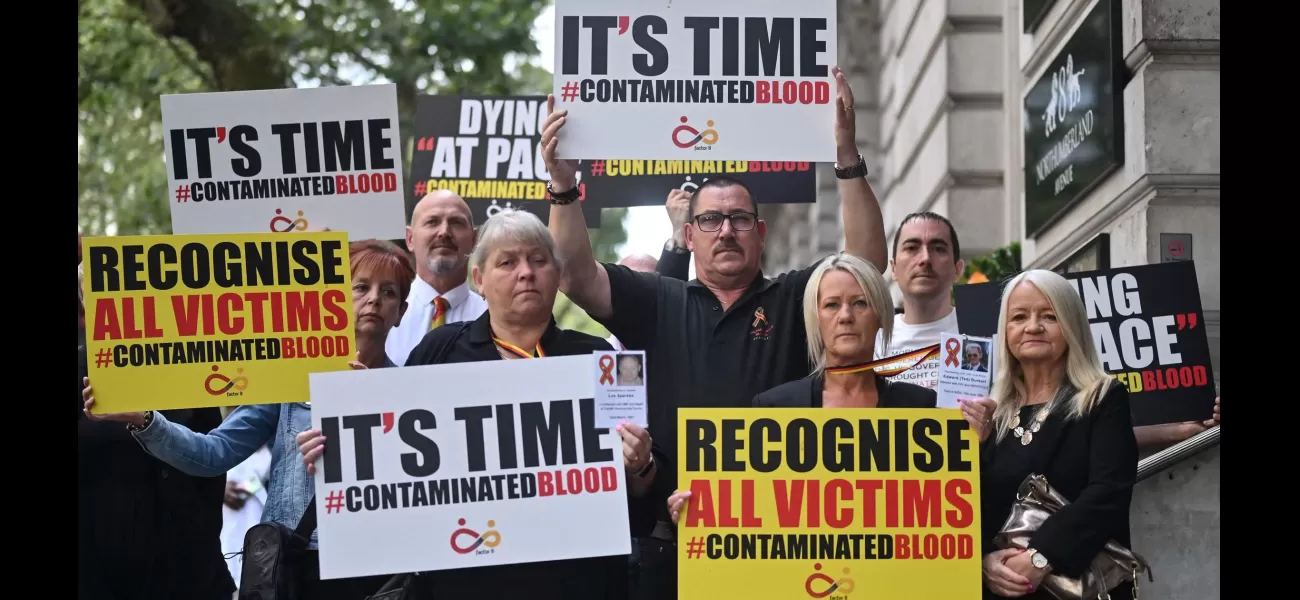Children were used in drug experiments and were given both hep C and HIV.
The NHS's infected blood scandal is considered the worst medical catastrophe to ever occur.
April 19th 2024.

In the late 1970s and 80s, the UK was rocked by a devastating scandal that took the lives of hundreds and continues to have far-reaching consequences today. It all started when doctors across the country began using contaminated blood treatments on children as part of their clinical research. This shocking revelation has been described as the "worst treatment disaster in the history of the NHS."
The victims of this scandal were mainly individuals with a rare blood disorder called haemophilia, which causes their blood to not clot properly. As a result, even minor cuts and scrapes could become life-threatening. To help manage their condition, these individuals relied on blood products that were imported from the US due to a shortage in the UK. Unfortunately, the products were made using blood from high-risk donors, including prisoners and drug addicts.
One of these products, known as Factor VIII, was particularly problematic. It was made using blood from 60,000 donors, and if even one of those donors was infected with a disease like HIV or hepatitis, the entire batch of Factor VIII would be contaminated. This is exactly what happened, and tens of thousands of people around the world were infected with these deadly diseases.
In the UK, the problem was made even worse by the fact that haemophilia centers continued to use these contaminated blood products, even after concerns were raised. In an effort to improve the treatments, doctors resorted to unethical testing practices on sick children, which only added to the tragedy.
One survivor, Lee Turton, contracted HIV from contaminated blood products when he was just four years old and sadly passed away six years later. Another survivor, Luke O'Shea-Phillips, was unknowingly used in a trial for a new version of Factor VIII when he was only three years old. Doctors believed that heat-treating the product could deactivate the HIV virus, but unfortunately, it did not have the same effect on hepatitis. Luke's mother was never informed of the change in his medication and he later found out that he had contracted hepatitis C, a potentially fatal disease.
The scandal also affected an entire cohort of haemophiliac boys at a school for vulnerable children. They were used as test subjects in various trials, including one that involved giving them large quantities of Factor VIII to see if it could prevent bleeding. Another trial involved giving the boys a placebo, which meant they were risking their lives by changing their behavior without actually receiving any treatment.
Sadly, hundreds of victims have died before receiving any compensation for the harm they suffered. The government has made interim payments of £100,000 to survivors and bereaved partners, but the total cost of the final compensation scheme is estimated to be in the billions of pounds.
A public inquiry into the scandal is in its final stages and is expected to produce a concluding report in May. The exact number of victims is difficult to determine, but it is estimated that 1,250 patients were infected with HIV and 2,400 were infected with hepatitis C in the UK. The Haemophilia Society believes that around 650 victims have died since the inquiry was announced in 2017.
The infected blood scandal has had a devastating impact on the lives of countless individuals and their families. It is a tragedy that should have never happened, and one that continues to unfold as more information comes to light. This scandal serves as a reminder of the importance of proper screening and ethical practices in the medical field.
The victims of this scandal were mainly individuals with a rare blood disorder called haemophilia, which causes their blood to not clot properly. As a result, even minor cuts and scrapes could become life-threatening. To help manage their condition, these individuals relied on blood products that were imported from the US due to a shortage in the UK. Unfortunately, the products were made using blood from high-risk donors, including prisoners and drug addicts.
One of these products, known as Factor VIII, was particularly problematic. It was made using blood from 60,000 donors, and if even one of those donors was infected with a disease like HIV or hepatitis, the entire batch of Factor VIII would be contaminated. This is exactly what happened, and tens of thousands of people around the world were infected with these deadly diseases.
In the UK, the problem was made even worse by the fact that haemophilia centers continued to use these contaminated blood products, even after concerns were raised. In an effort to improve the treatments, doctors resorted to unethical testing practices on sick children, which only added to the tragedy.
One survivor, Lee Turton, contracted HIV from contaminated blood products when he was just four years old and sadly passed away six years later. Another survivor, Luke O'Shea-Phillips, was unknowingly used in a trial for a new version of Factor VIII when he was only three years old. Doctors believed that heat-treating the product could deactivate the HIV virus, but unfortunately, it did not have the same effect on hepatitis. Luke's mother was never informed of the change in his medication and he later found out that he had contracted hepatitis C, a potentially fatal disease.
The scandal also affected an entire cohort of haemophiliac boys at a school for vulnerable children. They were used as test subjects in various trials, including one that involved giving them large quantities of Factor VIII to see if it could prevent bleeding. Another trial involved giving the boys a placebo, which meant they were risking their lives by changing their behavior without actually receiving any treatment.
Sadly, hundreds of victims have died before receiving any compensation for the harm they suffered. The government has made interim payments of £100,000 to survivors and bereaved partners, but the total cost of the final compensation scheme is estimated to be in the billions of pounds.
A public inquiry into the scandal is in its final stages and is expected to produce a concluding report in May. The exact number of victims is difficult to determine, but it is estimated that 1,250 patients were infected with HIV and 2,400 were infected with hepatitis C in the UK. The Haemophilia Society believes that around 650 victims have died since the inquiry was announced in 2017.
The infected blood scandal has had a devastating impact on the lives of countless individuals and their families. It is a tragedy that should have never happened, and one that continues to unfold as more information comes to light. This scandal serves as a reminder of the importance of proper screening and ethical practices in the medical field.
[This article has been trending online recently and has been generated with AI. Your feed is customized.]
[Generative AI is experimental.]
0
0
Submit Comment





